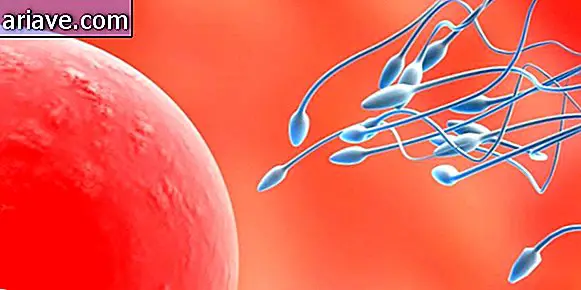Bill Andrews: The Man Who Wants To Make You Live 150 Years

Aging is a constant concern of the human being and, fortunately, object of study of science. Thanks to this, we are able to improve our quality and grow healthier. Right here, in Tecmundo, we have already released very curious research that attests that coffee and pets help people to grow older more slowly. Go to space and check emails less often too.
But there are people who do not find these solutions very effective and believe that the secret of prolonged youth lies in our own bodies. One such person is Bill Andrews, a molecular biologist and owner of Sierra Sciences, which now plans to expand the lifespan of humans to 150 years.
But to understand what Andrews has been doing, we must first go through some important concepts, as the scientist won the 1977 second place award as “National Inventor of the Year, ” having 35 US patents related to the telomerase.
Meet the telomeres
Dr. Andrews is the most authoritative person to talk about telomeres today. These pieces of non-coding DNA have been regarded as genetic waste for a long time, but they have a very important function: to protect the DNA with each multiplication. When a chromosome splits or multiplies, we lose telomeres instead of important pieces of our DNA.

The problem is that with each multiplication, the sequence of telomeres gets shorter, so scientists today measure the age of a cell based on the length of telomeres: the older you are, the smaller this chromosome stretch is. When these structures become too small, the cells become unable to reproduce, enter a state of paralysis known as senescence, or die.
This makes telomeres a kind of reverse chronometer of human aging and sets a theoretical limit of about 125 years for the human species. It's almost impossible to get past that age, no matter how healthy you are.
Andrews believes he can prolong youth
Now that you understand the first concept for this article, we can say that William Andrews does not agree very much with it. According to Andrews and other professionals, our reproductive cells do not lose parts of the telomere, because if they did, they would generate embryos as old as those of those involved in their generation, that is, the fetuses would be old.
Compared to other cells in the body, reproductive cells are immortal, meaning they do not spend telomeres. The reason this happens is due to the production of an enzyme known as telomerase, which is responsible for increasing telomeres again as they are reduced.
And what makes this knowledge interesting is the fact that all our cells have the ability to produce telomerase, but the gene responsible for this function is disabled. Thus, if we could activate this gene again, the cells of an adult would have their telomeres restored and thus become biologically young again, exceeding 125 years of life.
How to hack cells
Now Andrews's main mission, Sierra Sciences, is to find what they call “telomerase inducers, ” that is, drugs or chemicals that can activate the telomerase gene in the cells in which it is deactivated. And scientists have already been successful: they found more than 800 inducers after analyzing about 240, 000 compounds.

Unfortunately, none of the inductors found is strong enough to make telomeres grow fast enough to reverse a cell's age. But the search continues and about 4, 000 analyzes are performed weekly. If you depend on this pace of work and your dedication, it is very possible that Sierra will be able to find the compound you are looking for or, at worst, modify one already found to make it more powerful.
Your dog can live longer
In an interview with businessman David Bunell, Andrews said that if all goes well, they will be able to register drugs, test them, and, once approved by the Food & Drugs Administration, finally put them up for sale. However, this is a lengthy process that should last about 12 years.
And the benefits are not just for humans, as the biologist believes he can market this solution to the pet market as well. Researchers at the University of Texas and the University of Edinburgh found that cats, dogs and horses age similarly to humans, that is, by telomerase. Marketed inductors could then make someone's pet live longer. Unfortunately, they would not work with hamsters, gerbils, and other rodents, as their aging process is different.
Telomerase would fight AIDS
Medicine could also be refined with Sierra's scientific advances. According to Andrews, a particular type of stem cell, known as induced pluripotent, also often has reduced telomeres and may not be as effective. In this case, Andrews telomerase inducers could also help increase the efficiency of these cells.
But there are several cases in which this medicine could be used, including for very dangerous diseases. One is progeria, which causes children to age early and usually die before the age of 20. According to Andrews, helping to cure this disease would be a great satisfaction, even if it did not earn money for him and his staff.

Another case in which inducers could be applied concerns the immune system of AIDS patients. The immunity cells of a person with this disease end up having their telomere rapidly reduced as they try to wipe out the virus inside themselves, causing the body's defense to age faster. A telomerase inducer could also keep this immune system alive longer.
Andrews guarantees that his quest is not only for longevity but also to increase human health. According to the researcher, there are more than 100 diseases that could be controlled if telomere production could be manipulated, including cardiovascular problems, osteoporosis and even cancer.
So even if Andrews's ideas are wrong and aging cannot be controlled by telomerase, we could live longer, given the number of diseases that could be fought with the technique. For now, all we have to do is hope that Andrews has a fairly long life and pursues his research until he reaches his goals.











